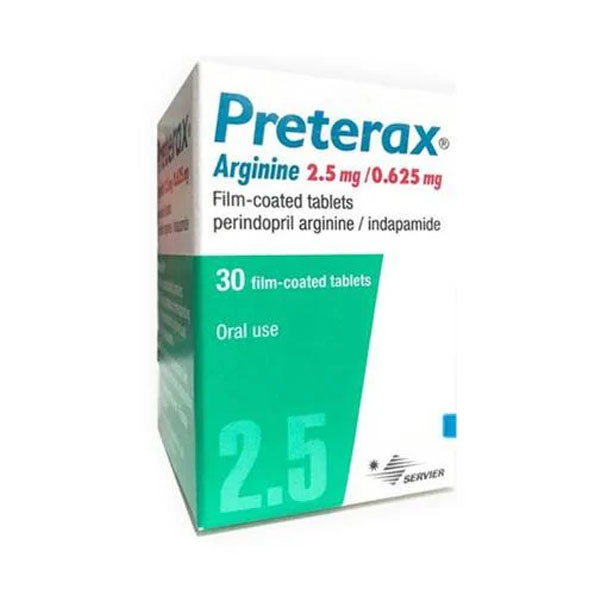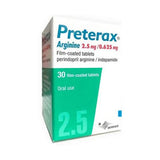Preterax 0.625 mg/2.5 mg 30 tablets:
Perindopril tert-butylamine tablets 0.625 mg / indapamide 2.5 mg.
What is perindopril tert-butylamine/indapamide and what is it used for?
- This product consists of two active ingredients; Perindopril tert-butylamine and indapamide.
- Perindopril is a medication that belongs to a class of medications known as an angiotensin-converting enzyme inhibitor; It works by widening blood vessels, making it easier for your heart to pump blood through them.
- Indapamide belongs to the class of medicines known as 'diuretics'. Diuretics work by increasing the urinary output produced by the kidneys.
- Indapamide is different from other diuretics because it does not cause excessive urination.
- This combination of active ingredients is used to help reduce and control blood pressure if you have high blood pressure.
Instructions for use:
- The recommended dose is one tablet orally once daily
- Your doctor may increase your dose to two tablets every day or change your dosing regimen if you have kidney dysfunction.
- Take the tablet before food in the morning.
- Take the tablet with a full glass of water.
- Take the medication exactly as prescribed by your doctor. Consult your doctor or pharmacist if you are not sure.
Do not take perindopril tert-butylamine/indapamide:
- If you are allergic to perindopril, any other angiotensin-converting enzyme inhibitor, indapamide, any other sulfonamides, or any of the other ingredients of this medication.
- If you have previously had angioedema due to perindopril or another ACE inhibitor. Angioedema is a condition manifested by signs and symptoms such as swelling of the face, throat, or tongue, wheezing, severe itching, or severe rash.
- If a family member has previously suffered from angioedema due to perindopril or another ACE inhibitor.
- If you are pregnant for more than 3 months.
- If you have diabetes or kidney problems and are taking aliskiren (a medicine used to treat high blood pressure).
- If you have liver disease or have previously had hepatic encephalopathy (brain disorder caused by severe liver damage).
- If you are taking sacubitril/valsartan (used to treat heart failure).
- If you are breastfeeding.
- If you suffer from renal artery stenosis (narrowing of the artery that supplies blood to the kidneys).
- If you are using dialysis or another type of blood filtration (depending on the type of filtration used).
- If you are suspected of having untreated heart failure (the heart muscle is unable to pump blood properly to the body).
Warnings and precautions:
- Stop taking the medicine immediately and talk to your doctor or pharmacist if you develop allergic reactions such as shortness of breath, rash, swelling of the face or neck, low blood pressure, or dizziness.
- Talk to your doctor if you have hypertrophic cardiomyopathy (a heart muscle problem), aortic stenosis (narrowing of the main blood vessel that leads to the heart) or renal artery stenosis (narrowing of the artery that supplies blood to the kidneys).
- Talk to your doctor if you suspect you have heart failure or other heart problems.
- Talk to your doctor before starting this medication if you have liver or kidney problems or if you are undergoing dialysis.
- Talk to your doctor before starting this medication if you have diabetes.
- Talk to your doctor before starting this medication if you have collagen vascular disease (a connective tissue disorder) such as scleroderma or systemic lupus erythematosus.
- Talk to your doctor before starting this medication if you are on a salt-restricted diet or use salt substitutes that contain potassium.
- Talk to your doctor before starting this medication if you are going to undergo LDL apheresis (removal of cholesterol from your blood using a machine).
- Talk to your doctor before starting this medication if you will be having surgery and/or anesthesia.
- Talk to your doctor before starting this medication if you are going to undergo desensitization treatment to reduce the effects of wasp stings or bee allergy.
- Talk to your doctor before starting this medication if you have an intolerance to certain sugars.
- Talk to your doctor before starting this medication if you have recently had vomiting, diarrhea, or dehydration.
- Talk to your doctor before starting this medication if you are pregnant or planning to become pregnant.
- Talk to your doctor before starting this medication if you have atherosclerosis.
- Talk to your doctor before starting this medication if you have photosensitivity reactions (skin reactions when exposed to ultraviolet light).
- Talk to your doctor before starting this medication if you are elderly.
- Talk to your doctor before starting this medication if you have hyperparathyroidism.
- Talk to your doctor before starting this medication if you have gout.
- The use of this medication for high blood pressure in patients of black descent is not recommended. This medication has been shown to cause an increased risk of angioedema and may be less effective in patients of black descent.
- Be sure to tell your healthcare provider that you are taking this medication if you are having a medical test that requires injection of an iodinated contrast agent (a substance used to make your organs such as your stomach or kidneys visible on an X-ray).
- Be sure to tell your healthcare provider if you have any signs of glaucoma (high pressure in your eyes) such as changes in your vision or pain in one or both eyes while taking this medication. If this occurs, stop taking the medication and seek immediate medical attention.
- If you are an athlete, taking this medication may cause a positive reaction on drug tests because it contains indapamide.
Possible side effects:
- Rare but serious side effects include signs of an allergic reaction such as; Itchy rash, angioedema (swelling with a red rash under the surface of the skin in a localized part of the body on or near the hands, feet, lips, or eyes),
- Low blood pressure, bronchospasm (tightening of the chest, difficulty breathing and wheezing), irregular heartbeat, pain in the jaw, chest and back due to physical exertion, signs of pancreatitis (fatigue and severe pain in the abdomen and back),
- Signs of liver problems (yellowing of the skin or eyes, white stools and dark urine) and signs of Stevens-Johnson syndrome (a rare and serious skin disease that usually begins with signs of the flu and is followed by a severe and painful rash with blisters).
- Common side effects include dizziness, headache, vertigo, vision problems, pins and needles sensation, tinnitus (noise in your ears),
- Cough, shortness of breath, nausea, diarrhea, constipation, indigestion, taste changes, vomiting, abdominal pain, fatigue and muscle cramps.
Other medicines and perindopril tert-butylamine/indapamide:
- If you take blood pressure medications (such as Aliskiren).
- If you are taking diuretics (used to increase urination).
- If you are taking NSAIDs (used to reduce inflammation, pain and fever such as ibuprofen) or high dose aspirin.
- If you take medicines to treat diabetes (such as metformin or insulin).
- If you are taking lithium (used for depression or mania).
- If you are taking eplerenone (used to treat heart failure).
- If you take potassium-sparing medications (such as spironolactone, amiloride, triamterene), potassium-containing salt substitutes or potassium supplements.
- If you are taking baclofen (used to treat muscle stiffness in diseases such as multiple sclerosis).
- If you are taking corticosteroids or immunosuppressants (medicines used to reduce the body's defense after a transplant or to treat autoimmune disorders such as cyclosporine and tacrolimus).
- If you are taking medicines to treat mental disorders such as anxiety, depression and schizophrenia (such as antipsychotics and tricyclic antidepressants).
- If you are taking heparin (a blood thinner).
- If you are taking procainamide (used to treat irregular heartbeats).
- If you are taking estramustine (used to treat cancer).
- If you are taking allopurinol (used to treat gout).
- If you are taking gold salts, especially when given into a vein (used to treat signs and symptoms of rheumatoid arthritis).
- If you are taking trimethoprim (used to treat infections).
- If you are taking vasodilators including nitrates (medicines to widen blood vessels).
- If you are taking medicines to treat asthma, shock, and low blood pressure (such as ephedrine, adrenaline, or noradrenaline).
- If you are taking racecadotril (used to treat diarrhoea).
- If you are taking pentamidine (used to treat pneumonia).
- If you are taking halofantrine (used to treat some types of malaria).
- If you are taking sacubitril/valsartan (used to treat heart failure).
- If you are taking methadone (used to treat addiction).
- If you are taking sparfloxacin or moxifloxacin (antibiotics).
- If you are taking terfenadine, mizolastine or astemizole (antihistamines used for allergies or hay fever).
- If you are taking vincamine (used to treat symptomatic cognitive disorders in older people including memory loss).
- If you are taking bepridil (used to treat angina).
- If you are taking medicines to treat an irregular heartbeat (such as amiodarone, quinidine, sotalol, hydroquinidine, disopyramide).
- If you are taking cisapride or difemanil (to treat digestive problems).
- If you are taking digoxin or other cardiac glycosides (used to treat heart problems).
- If you take calcium including calcium supplements.
- If you are taking stimulant laxatives (such as senna).
- If you are taking amphotericin B by injection (used to treat severe fungal infections).
- If you are taking tetracosactide (used to treat Crohn's disease).


